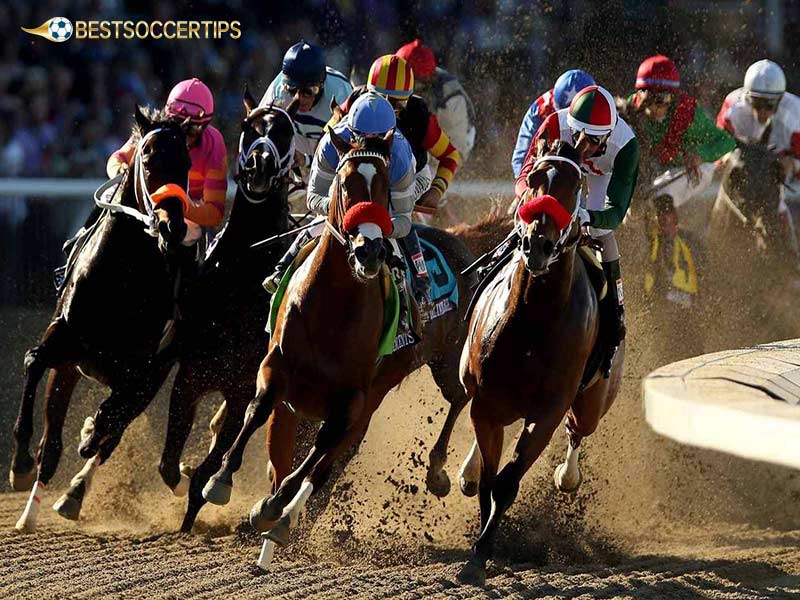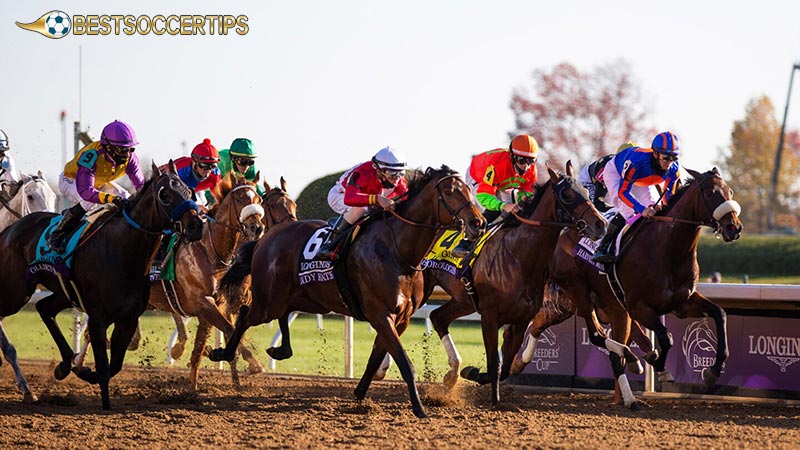Horse racing betting rules are quite intuitive but worth revisiting due to the lack of direct comparison with other sports. Typically, the jargon and complexity of horse racing can make certain betting rules confusing. It’s crucial to understand how to bet on horse racing in general. In this guide, bestsoccertips will help you learn everything you need to know about the basic rules of horse racing.

Horse Racing Rules
The general betting rules of Smarkets (1-11) will apply unless superseded by specific Terms and Conditions or the particular betting rules of the sport.
General
Markets will initially be settled based on which horse passes the first post. The subsequent ‘weighed in’ result will be considered the official result. Any protests, amendments, etc., to the result afterward will not be considered.
Horses are identified by their names. Bets on named runners will be settled for that runner regardless of the race card number. While Smarkets endeavors to ensure the accuracy of information regarding silks, jockeys, etc., this information is provided as a guide only. Smarkets does not guarantee its accuracy and is not liable for any bets placed based solely on this information.
Bets are placed on individual horses. Joint horses are not counted for betting purposes.
If the race is declared “void” or abandoned by the manager, or in the event of a walkover, all markets related to the race will be voided.
If a horse runs solely to earn money and is not considered a valid runner for betting purposes, all bets on that horse will be void, and reduction factors will apply as necessary.
Smarkets reserves the right to make a ruling if an incident occurs outside the scope of these rules.
Place Markets
Places in local markets are usually calculated as follows:
- 5 to 7 scheduled runners at the time of market creation: 1st, 2nd place;
- 8 to 15 scheduled runners at the time of market creation: 1st, 2nd, 3rd place;
- 16 or more scheduled runners (excluding handicaps) at the time of market creation: 1st, 2nd, 3rd place;
- 16 or more scheduled runners (handicaps) at the time of market creation: 1st, 2nd, 3rd, 4th place.
However, please note that these numbers are not definitive, and the number of places displayed in the market title will take precedence in case of any discrepancy.
A horse withdrawing from the race and becoming a non-runner does not affect the number of winners in each market. If the number of places offered equals or exceeds the number of runners, all bets in this category will be void. Risks are not combined between “to win” and “to place” markets. Commissions are paid separately for “win” and “place” markets.
Reduction Factors
The Reduction Factor rules, akin to Rule 4 deductions in racecourse betting, dictate the handling of non-runners in horse racing. Each runner is assigned a reduction factor by Smarkets, reflecting their estimated winning probability.
When a horse is withdrawn from a race, rendering it a non-runner because it didn’t start as per the lineup, all bets on that horse are voided. In the win market, if the non-runner’s reduction factor is less than 2.5%, bets on other runners remain unaffected. If the reduction factor is 2.5% or more, matched bets are adjusted proportionally, and unmatched bets are voided before the market reopens.

For instance, a bet at odds of 4 with a 25% reduction due to a non-runner would be adjusted to odds of 3.
In the place market, all bets on a withdrawn horse are voided, and reduction factors are applied to adjust odds for remaining bets. For example, odds of 4 with a 25% reduction would adjust to 3.25, thereby reducing both liability for bettors and potential winnings for backers.
Only horses officially scheduled to race are considered for reduction factors. If a reserve horse replaces a withdrawn runner, reduction factors may be recalibrated accordingly. These factors are dynamic and subject to change based on pre-race adjustments or post-race evidence of a horse’s inability to run.
Ante-Post Markets
Once the race has been announced, ante-post betting is considered closed. All bets remain valid whether the horse runs or not unless the horse is withdrawn, in which case all bets on that horse will be void. Reduction factors do not apply to ante-post markets. Risks are not combined between ante-post and day-of-race markets. Commissions are paid separately for ante-post and day-of-race markets.
If a horse is listed in a pre-post market and declared a runner, all markets where the horse is declared a runner will be paused while Smarkets determines the accuracy of the information and the moment the horse retreats. Where this information is confirmed, the runner will be removed from the market and if applicable, all bets placed from midnight of the withdrawal date will be void. If it is not possible to determine the exact withdrawal time, Smarkets may, at its sole discretion and based on all available information, decide to cancel bets at a reasonable time.
Additional horses may be added upon request.
Types of Horse Racing Bets
You have two types of bets to choose from when betting on ponies: straight bets and exotic bets. For beginners, I recommend placing straight bets. They are simple and inexpensive. You only need to pick one horse to finish first, second, or third. The minimum bet at most tracks for a straight wager is just $2.
Exotic bets allow you to place multiple bets on multiple horses in a single wager. Exotic bets are generally much harder to win than straight bets, requiring advanced skills and knowledge in horse selection and are more expensive. However, the payouts for exotic bets are significantly higher than straight bets.
Straight Bets
In betting on horse races, different types of straight bets offer varying levels of risk and reward based on where your chosen horse finishes in the race.
- A WIN bet means you believe your horse will finish first. If it does, you win your bet.
- A PLACE bet covers your horse finishing either first or second. The payout is less than for a win bet but provides insurance if your horse finishes in the top two.
- A SHOW bet includes your horse finishing in the top three. The odds are lower than for win or place bets due to the increased likelihood of winning.
- ACROSS THE BOARD is a combo straight bet involving three bets in one: win, place, and show. For example, a $2 bet across the board costs $6 ($2 each for win, place, and show). If your horse wins, you collect all three payouts; if second, you collect place and show; if third, only show.
- WIN/PLACE and PLACE/SHOW bets are similar combos. A $2 win/place bet costs $4 ($2 for win, $2 for place), with payouts if your horse wins or places. A place/show bet costs $4 ($2 for place, $2 for show), with payouts if your horse places or shows.

These bets offer flexibility and varying payouts depending on how conservative or aggressive you want to be with your bet. Across-the-board bets, while covering multiple outcomes, are costly and may not yield high profits. Win/place and place/show bets are alternatives for covering multiple scenarios with a single wager, providing different levels of risk and cost.
Exotic bets allow you to bet on multiple horses in one bet, increasing your potential profit. But as mentioned earlier, they are much harder to win than straight bets, can be costly if not careful, and require more skill in handicapping. Feel free to experiment with some exotic bets after you’ve placed a few straight bets.
Exacta
You are betting on two horses to finish first and second in exact order. For example, if you place an exacta bet of $2 on horses 3 and 5, you only win if horse 3 finishes first and horse 5 finishes second. Exacta bets are popular among skilled horse players because the payouts can be lucrative. You can also “box” your exacta bet, meaning your two horses can come in either order in the top two positions and you still win. Boxing an exacta costs twice as much as a straight exacta bet. So, boxing a $2 exacta on horses 3 and 5 will cost you $4.
Quinella
With a quinella bet, you are betting on two horses to finish first and second in either order. As long as your two horses finish in the top two positions, you win. Therefore, if you place a $2 quinella bet on horses 1 and 6, you win if horse 1 and horse 6 finish first and second in any order. You might be thinking, “What’s the difference between a quinella and an exacta box? Both allow you to win if your two horses finish first or second.” The biggest difference is cost: a $2 quinella bet costs $2, whereas boxing a $2 exacta costs $4. That’s why someone would pay more for a box even though it’s essentially a quinella bet. That’s why the payout for an exacta box is usually higher than for a quinella bet.
Trifecta
You bet on three horses to finish first, second, and third in exact order. If you place a $2 trifecta bet on 1-5-7, you only win if horse 1 finishes first, horse 5 finishes second, and horse 7 finishes third. You can also box your three horses so that you win if they finish first, second, and third in any order. Boxing a trifecta significantly increases the cost of your bet due to the increased combinations. Therefore, placing a $2 trifecta box will cost you $12, or a $1 trifecta box will cost you $6.
Superfecta
You bet on four horses to finish first, second, third, and fourth in exact order. Similar to exactas and trifectas, you can box a superfecta for an additional fee. The minimum bet is usually 10 cents, making it more attractive to many.
Conclusion
Understanding horse racing betting rules is essential for anyone looking to place bets on races. Whether you are a beginner starting with straight bets or an experienced bettor exploring the complexities of exotic bets, knowing the rules can enhance your betting experience and increase your chances of success. Always be mindful of the different types of bets, the costs involved, and the potential payouts. With this knowledge, you can make more informed decisions and enjoy the excitement of horse racing betting.
See more: Collection of the best UFC player today




